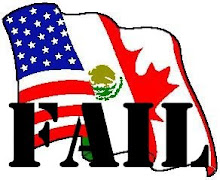CBP had to do a bit of damage control after one of their own called the Port Angeles border patrol office a black hole with no mission or purpose, and that they had very little work to perform. Interestingly, the officer has gone off the radar although he’s supposedly still working for CBP (one can only imagine what happens internally to those that speak out in such a way).
Back to the damage control though – so the Port Angeles supervisor, Jose Romero, addressed the Port Angeles Regional Chamber of Commerce on Monday at a luncheon, wanting to reaffirm them that the CBP presence did have value, that they weren’t short of work, they weren’t a black hole, etc. etc. You can read about the event from the SeattlePI website here.
Now, I’m going to assume that article follows good journalistic integrity, and that anywhere there’s quotes indicates something that was actually said. So let’s examine some of the soundbites shall we?
Romero devoted much of his 45-minute presentation to immigration issues, adding that an immigration violation can be charged as a felony.
Border Patrol checkpoints are "part of what we do," he added. "We look for ways to determine who is coming into this country illegally and who hasn't."
Questioning someone's immigration status comes partly from a "gut feeling" the agent might have about the person and often begins by "just going up to someone and saying, 'Hi, how are you?'" Romero said.
"There is a very short window to make the determination to go to the next level," he said.
That next level could include asking for a name and date of birth, which agents run through a database.
I don’t doubt that “gut feelings” are part of any law enforcement process. Of course, this means that people can be singled out not necessarily due to one’s appearance or mannerism, but even if the officer doesn’t understand what you do for a living.
Also interesting is that “asking for a name and date of birth” is the “next level”. All people need to present a passport when entering the US, which brings up their information from a database. In fact, for those that have never experienced it, it usually starts with:
Hello. Where are you going? What for? How long will you be in the US? Where are you staying? Who do you work for?
I found it funny that what’s presented is some sort of watered down version of reality – that based on how someone responds to “how are you” determines if they’re inspected further. Everyone is inspected further. The only “next level” is secondary inspection.
Alright, let’s look at a second bit from the article:
"The northern border has now become the focal point," Romero said. "It's extremely porous."
Canada has not been the easiest partner to work with in monitoring the shared boundary despite the existence of what Romero said were "75 known factions of some kind of terrorist group" in that country.
"It's not as good as I would like," Romero said of "cooperation" from Canada. "We're working hard to get that relationship going."
Hmm…pretty sure there’s more drug, violent crime, and illegal immigration activity happening at the south Jose, so while Canada might be a focal point for you to justify your role, I don’t think we present as much danger as you think.
Wait, wait…he did mention that there are 75 known factions of some kind of terrorist group in Canada. Here’s the funny thing: Canada actually only lists 43 groups as known terrorist organizations, so not sure where the other 32 came from (maybe the US has a different list?). And I’m happy to hear that cooperation from Canada isn’t as good as they’d like, only because what we’ve seen from the US is “cooperation” usually means “give us what we want”. Considering that Canada customs asked me where I was staying after my last trip to the US, I’m pretty sure there’s quite a bit of information already being shared.
Whether the Port Angeles post is a black hole or not, or whether we’ll ever see that young officer who blew the whistle, we’ll probably never know. What we do know from this luncheon is that the Port Angeles Regional Chamber of Commerce got a rosier, American-friendly picture of border security that may not accurately reflect what’s really happening.



